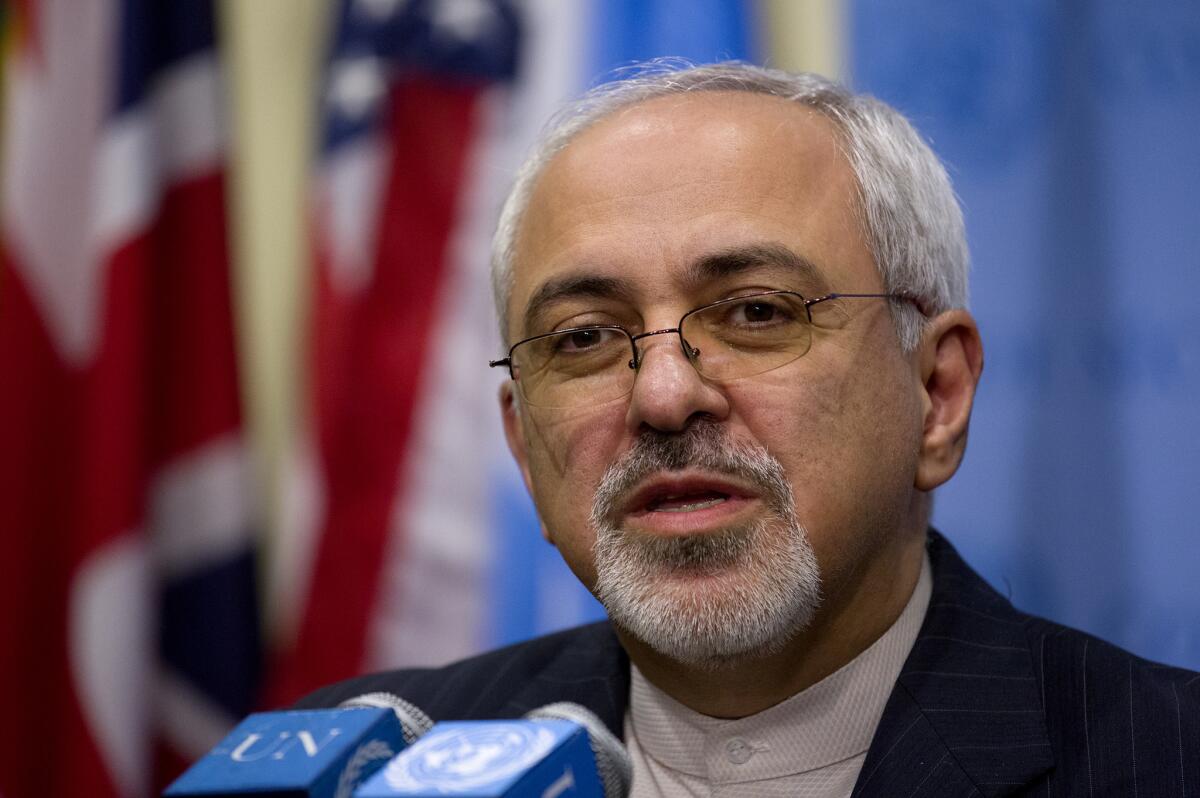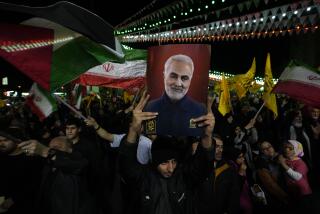Iran foreign minister talks conciliation, calls for end to sanctions

WASHINGTON — Iran’s foreign minister said Sunday that his country was willing to negotiate with the United States over its nuclear program but that Washington needed to reciprocate by stopping the sanctions that have crippled Iran’s economy.
Taking a tone that was conciliatory at times but mainly tough, Mohammad Javad Zarif said in an interview with ABC’s “This Week” that the U.S. and Iran had taken the “first step in removing the tensions, doubts and misgivings that the two sides have had about each other for the last 30-some years.” Zarif met with U.S. Secretary of State John F. Kerry last week in New York, and President Obama spoke by phone Friday with Iranian President Hassan Rouhani, the countries’ first direct contact at that level since Iran’s 1979 Islamic revolution.
Speaking in fluent English, the American-educated Zarif also insisted that Iranian officials do not believe the Holocaust is a myth. A statement referring to the “myth of the massacre of Jews” in a speech by the country’s Supreme Leader, Ayatollah Ali Khamenei, is a “bad translation,” he told interviewer George Stephanopoulos.
“The Holocaust is not a myth. Nobody’s talking about a myth,” Zarif said, when asked about the quotation. “If it’s there,” he said, “it’s a bad translation, and it’s translated out of context.”
“This is the problem when you translate something from Persian to English, you may lose something, as the film goes, ‘Lost in Translation,’ you may lose some of the meaning,” he added.
“[The] Holocaust was a heinous crime, it was a genocide, it must never be allowed to be repeated, but that crime cannot be and should not be a justification to trample the rights of the Palestinian people for 60 years,” he said.
Last week, when Iranian president Hassan Rouhani made a comment in an interview on CNN in which he said he accepted the Holocaust as an historical fact, some Iranian media outlets connected to hard-line factions used the translation argument in the other direction, arguing that CNN had misconstrued Rouhani’s remarks. His predecessor as president, Mahmoud Ahmadinejad, had questioned the reality of the Holocaust several times in public statements, one of several moves that deepened Israeli fears of Iran’s intentions.
Zarif also insisted that Tehran never had military intentions with its uranium enrichment and other nuclear activities. “Iran is prepared to start negotiating” on the issue, he said, adding that the United States also must do certain things, including halting what he contended were ”illegal sanctions against Iran that are targeting ordinary Iranians.”
Iran has been hit with sanctions from the United Nations’ Security Council as well as additional measures aimed at its oil and banking sectors imposed by the U.S. and the European Union.
“We believe that if the United States is ready to recognize Iran’s rights, to respect Iran’s rights and move from that perspective, then we have a real chance, and we negotiate with the full authority of the leader,” Zarif said, referring to Ayatollah Khamenei.
He spoke of hope that decades of hostile relations between the U.S. and Iran could be mended. But the foreign minister also said that while his country was willing to forgive its troubled history with the United States, Iran could not forget it.
“Iran’s very serious and deep mistrust of the behavior of the United States needs to be addressed,” he said.
That mix of hope and doubt has been common to both countries, with Iran’s recent overtures being met with skepticism by Obama and many U.S. lawmakers, even as the president expressed confidence about the possibility that the two sides could find a “comprehensive solution” to the nuclear problem.
Underscoring the political challenges that Obama will face on Iran, Sen. Robert Menendez (D-N.J.), the chairman of the Senate Foreign Relations Committee, and Sen. Lindsey Graham (R-S.C.), a leading foreign policy expert in his party, said Sunday that although they would not ignore the diplomatic outreach by Iran, they would continue to press to maintain and toughen sanctions.
“Diplomacy is our hope, but the U.S. resolve to take whatever action is necessary to prevent Iran from becoming a nuclear state will not be compromised,” they said in an opinion piece in the Washington Post. “In the coming days, we will be outspoken in our support for furthering sanctions against Iran, requiring countries to again reduce their purchases of Iranian petroleum and imposing further prohibitions on strategic sectors of the Iranian economy.”
That tack is certain to be emphasized by Israeli leaders, who have reacted to Iran’s outreach with deep suspicion. Israeli Prime Minister Benjamin Netanyahu, who is scheduled to meet with Obama on Monday, was said to be preparing to counter Iran’s “sweet talk” in that meeting and a subsequent speech to the United Nations General Assembly on Tuesday.
“I intend to tell the truth in the face of sweet talk and Iran’s offensive of smiles,” Netanyahu said Saturday night before boarding his plane to fly to the U.S. “Telling the truth today is vital for the security and peace of the world and, of course, it is vital for the security of our country.”
ALSO:
Pakistan: Car bomb kills at least 43 in Peshawar market
Questions linger about China’s new Shanghai free-trade zone
Security Council votes unanimously to destroy Syrian chemical weapons
More to Read
Start your day right
Sign up for Essential California for news, features and recommendations from the L.A. Times and beyond in your inbox six days a week.
You may occasionally receive promotional content from the Los Angeles Times.







